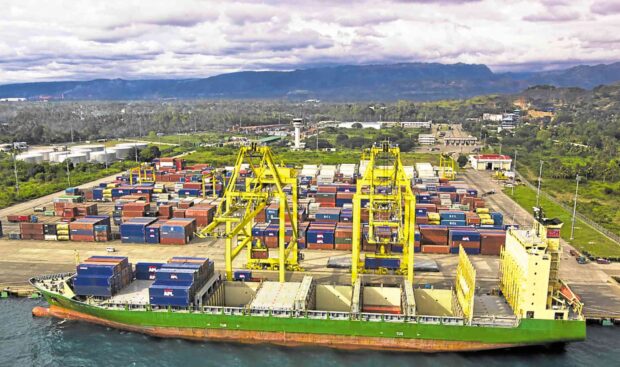Marcos orders pre-border invoicing to speed up inspection of imported goods

TRADE LINK Container vans are loaded into a ship at Mindanao Container Terminal inside the Phividec Industrial Estate in Misamis Oriental. The port is Mindanao’s main platform for international trade. — File photo courtesy of MINDANAO CONTAINER TERMINAL
MANILA, Philippines — The government will be implementing digital and integrated pre-border technical verification and cross-border electronic invoicing of all imported products, the Presidential Communications Office (PCO) said.
These steps will be carried out through Administrative Order (AO) No. 23, signed last May 13 and published on May 19.
READ: Bureau of Customs exceeds February 2024 revenue collection target
In a statement, the PCO said that the AO targets speeding up the inspection process of all imported goods entering the country.
The order also aims to further strengthen national security, safeguard consumers’ rights, and protect the environment against poor quality and dangerous imported goods, it added.
Article continues after this advertisement“A single electronic invoicing system controlled by the Philippine Government is necessary to effectively monitor international trade transactions of all imported goods,” the AO read.
Article continues after this advertisementREAD: Customs bureau reports exceeding target revenue goal in last 11 months
It also ordered the creation of the Committee for Pre-border Technical Verification and Cross-Border Electronic Invoicing.
The committee will be composed of the secretary of finance as the chairperson and the secretaries of agriculture, trade, energy, health, environment and natural resources, and information and communications technology as members.
The Bureau of Customs (BOC) commissioner, the director general of the Philippine Drug Enforcement Agency, and two non-voting representatives from duly recognized industry associations, will also be part of the panel.
The PCO said BOC, being the lead government agency responsible for implementing customs procedures, shall implement the electronic invoicing system.
It will be in accordance with the strategic direction and policy guidance, international trade standards, and existing laws and regulations.
The PCO added the provisions of the AO shall be applied to all imported commodities in three phases.
These are phase one for agricultural products; phase two for non-agricultural goods with health and safety issues; and phase three for other goods with misdeclaration to avoid duties and taxes.